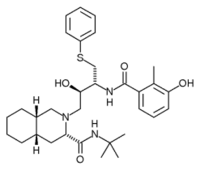Viracept
Nelfinavir (Viracept®) is an antitretroviral drug used in the treatment of the human immunodeficiency virus (HIV). Nelfinavir belongs to the class of drugs known as protease inhibitors (PIs) and like other PIs is generally used in combination with other antiretroviral drugs; the other major group of antiretrovirals is the reverse transcriptase inhibitors. Nelfinavir is presented as the mesilate (mesylate) ester prodrug. more...
History
Nelfinavir was developed by Agouron Pharmaceuticals, at the time a division of Japan Tobacco but now a subsidiary of Pfizer. It was granted FDA approval for therapeutic use in 1997. Agouron's patent on the drug will expire in 2014.
Mode of action
Nelfinavir is a protease inhibitor: it inhibits HIV-1 and HIV-2 proteases. This protease is an enzyme which cleaves viral protein molecules into smaller fragments, and it is vital for both the replication of the virus within the cell and also the release of mature viral particles from an infected cell. Though this mode of action is common to all protease inhibitors, the precise mode of binding of nelfinavir to the enzyme may be sufficiently unique to reduce cross-resistance between it and other PIs. Also, not all PIs inhibit both HIV-1 and HIV-2 proteases.
Toxicity
Nelfinavir can produce a range of adverse effects. Common (experienced by more than one in one hundred patients; greater than 1%) are flatulence, diarrhoea or abdominal pain. Infrequent (experienced by one in one thousand to one in one hundred patients; 0.01 - 0.1%) adverse effects are fatigue, rash, mouth ulcers or hepatitis. Rarely (less than one in one thousand patients; under 0.01%) nephrolithiasis, arthralgia, leucopenia, pancreatitis or allergic reactions may occur.
Interactions
Nelfinavir's interaction profile is similar to that of other protease inhibitors. Most interactions occur at the level of the Cytochrome P450 isozyme 3A4, by which nelfinavir is metabolised.
Read more at Wikipedia.org



